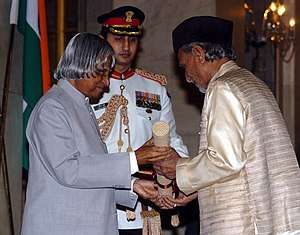Sabri Khan
Ustad Sabri Khan (21 May 1927 – 1 December 2015) was an Indian sarangi player, who was descended on both sides of his family from a line of distinguished musicians.
Ustad Sabri Khan | |
|---|---|
 Sabri Khan on a 2018 stamp of India | |
| Background information | |
| Born | 21 May 1927 Moradabad, Uttar Pradesh, India |
| Died | 1 December 2015 (aged 88) New Delhi, Delhi, India |
| Genres | Indian classical music, Hindustani classical music |
| Instruments | Sarangi |
Early life
Sabri Khan was born on 21 May 1927 in Moradabad, Uttar Pradesh.[1] He belonged to the Sainia Gharana. This Gharana traces the tradition of its music back to Mian Tansen, the great vocalist in the court of Mughal Emperor Akbar. He had been initiated into sarangi-playing by his grandfather, Ustad Haji Mohammed Khan and later continued his training under his father Ustad Chajju Khan, both accomplished sarangi exponents of their time. Khan also learned some important and rare techniques of playing from his uncle Ustad Laddan Khan of Rampur.
Music career
Sabri Khan toured extensively across the world and performed in Afghanistan, Pakistan, China, Japan, USSR, Russia, US, Canada, England, France, Germany, the Netherlands, Belgium, Italy, Spain, the Czech Republic, Slovakia, Bulgaria, Sweden, Norway, Finland and Mexico. The credit of introducing the Sarangi to American and European audiences goes to Sabri Khan. He also played a duet with the renowned Yehudi Menuhin and was invited as a visiting professor by the University of Washington, Seattle, USA.
In appreciation of his contribution to the Classical Music of India, Ustad Sabri Khan received numerous honours and awards, including the Sahitya Kala Parishad Award, UP Sangeet Natak Academy Award, National Sangeet Natak Academy Award, the prestigious Padma Shree Award (1992) and Padma Bhushan Award (2006) by the Hon. President of India – Government of India.[2]
Family
Ustad Sabri Khan Sahib has four sons- Sarwar Sabri (Musician – Tabla; living in Birmingham), Jamal Sarwar Sabri (Chartered Accountant; living in Dubai), Kamal Sabri (Musician – Sarangi; living in Delhi) and the youngest Gulfam Sabri (Musician – Tabla and Vocal; living in Delhi) and five daughters. He has many grandsons playing musical instruments: Suhail Yusuf Khan (Sarangi), Faisal Khan(Tabla), Shariq Khan(Tabla), Junaid (Guitar) and Nabeel Khan (Sarangi).
In the early morning on 1 December 2015, Ustad Sabri Khan died surrounded by his family at his home in New Delhi.[3]
Awards and honours

- Sahitya Kala Parishad Award
- Shobhna Kala Sangam Award – 1985
- Begum Akhtar Award
- Sangeet Natak Akademi Award – 1986
- Uttar Pradesh Sangeet Natak Academy Award, Lucknow, UP – 1990
- Padma Shree Award by the President of India, Government of India – 1992
- Ustad Chand Khan Award – 2002
- Sangeet Bhushan Award – 2002
- Lifetime Achievement Award – LEGENDS OF INDIA – DMA – Delhi – 2003
- National Artist Award – All India Radio Prasar Bharti Award – 2004
- Padma Bhushan Award by the President of India, Government of India – 2006
- Sangeet Natak Akademi Tagore Ratna Award – 2012
Sabri Khan received several national awards, including the Padma Shri in 1992 and the Padma Bhushan in 2006.[4]
References
- Hunt, Ken. "Sabri Khan – Biography". Allmusic. Retrieved 16 March 2009.
- "Padma Awards" (PDF). Ministry of Home Affairs, Government of India. 2015. Archived from the original (PDF) on 15 November 2014. Retrieved 21 July 2015.
- "Ustad Sabri Khan Saheb has passed away earlier this morning. 21 May 1927 – 1 December 2015". Suhail Yusuf Khan (New Delhi). 2015. Retrieved 1 December 2015.
- "Padma Awards". Ministry of Communications and Information Technology (India). Retrieved 8 March 2009.